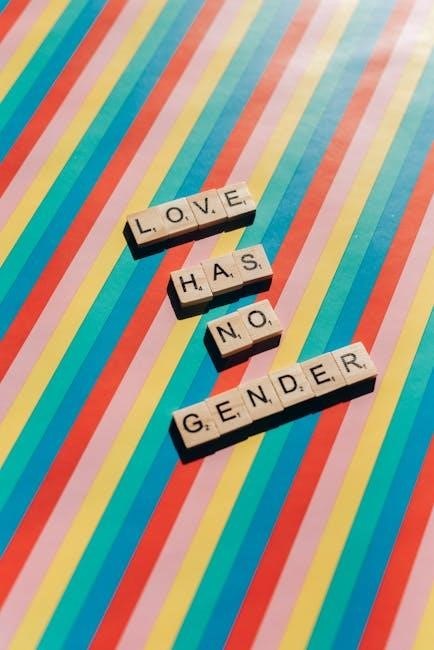personal bill of rights pdf

A Personal Bill of Rights is a powerful tool for self-empowerment, helping individuals establish boundaries and assert their dignity. It promotes self-respect, confidence, and personal growth by clarifying one’s entitlement to make choices, express emotions, and prioritize well-being. This document serves as a foundation for healthy relationships and self-advocacy, fostering a mindset of self-worth and resilience.
1.1 Definition and Purpose
A Personal Bill of Rights is a document outlining fundamental entitlements for individuals to assert their dignity, autonomy, and self-respect. Its purpose is to empower people to recognize and communicate their needs, boundaries, and values clearly. This tool fosters self-awareness, healthy relationships, and personal growth by providing a clear guide for interactions and decision-making. It serves as a reminder of one’s inherent worth and the right to live authentically, free from undue guilt or shame.
1.2 Importance of Self-Esteem and Confidence
Cultivating self-esteem and confidence is essential for asserting personal rights effectively. Healthy self-esteem enables individuals to recognize their worth, express needs without guilt, and set boundaries. Confidence empowers them to communicate feelings and make decisions assertively. Together, they foster resilience, personal growth, and the ability to maintain dignity in all interactions. A strong sense of self-worth is the foundation for living authentically and embracing the principles outlined in a Personal Bill of Rights.
Understanding the Personal Bill of Rights
A Personal Bill of Rights is a document outlining individual entitlements, empowering self-respect and boundary-setting. It clarifies rights like expressing feelings, making choices, and seeking growth, fostering confidence and dignity in personal and relational contexts.
2.1 What is a Personal Bill of Rights?
A Personal Bill of Rights is a customized document that outlines an individual’s fundamental entitlements, promoting self-respect and empowerment. It serves as a guide for asserting personal boundaries, expressing emotions, and making decisions. This document is tailored to reflect one’s values and needs, helping to foster healthy relationships, self-confidence, and a clear sense of identity. It is a tool for personal growth and self-advocacy, enabling individuals to live authentically and with dignity.
2.2 How it Differs from Legal Documents
A Personal Bill of Rights differs from legal documents as it is not legally binding but a personal, subjective guide. Unlike legal documents, it focuses on individual entitlements and boundaries rather than societal or governmental enforcement. It emphasizes emotional and psychological well-being, serving as a tool for self-respect and empowerment. While legal documents are formal and universal, a Personal Bill of Rights is flexible and tailored to personal growth and relationships.

Key Rights in a Personal Bill of Rights
A Personal Bill of Rights outlines essential entitlements, such as the right to ask for what you want, say no, express feelings, and make mistakes. These rights empower individuals to assert their boundaries, fostering self-respect and confidence while promoting emotional well-being and personal growth.
3.1 The Right to Ask for What You Want
The right to ask for what you want is fundamental to self-advocacy and personal empowerment. It allows individuals to express their needs, desires, and expectations clearly and respectfully. This right encourages open communication, helping to establish healthy boundaries and mutual respect in relationships. By asserting this right, you honor your own voice and priorities, fostering confidence and emotional well-being. It’s about reclaiming your power to seek what you deserve without guilt or hesitation.
3.2 The Right to Say No
The right to say no is a cornerstone of personal empowerment, allowing individuals to set boundaries and protect their time, energy, and well-being. It enables you to decline requests that don’t align with your values or priorities without guilt or justification. Exercising this right fosters healthy relationships, reduces resentment, and promotes self-respect. Saying no with confidence honors your needs and encourages others to respect your limits, supporting a balanced and fulfilling life.
3.3 The Right to Express Your Feelings
The right to express your feelings is essential for emotional well-being and honest communication. It allows you to convey emotions, whether positive or negative, without fear of judgment or rejection. Expressing feelings fosters intimacy, resolves conflicts, and maintains psychological health. This right encourages authenticity, helping you connect deeply with others while preserving your mental and emotional balance. It’s a vital aspect of living truthfully and building meaningful relationships.
3.4 The Right to Change Your Mind
The right to change your mind is a fundamental aspect of personal freedom and growth. It allows you to adapt to new information, evolving circumstances, or shifting priorities without guilt or shame. Recognizing this right encourages flexibility, self-awareness, and the ability to make decisions that align with your current values and goals. Embracing change fosters personal development and empowers you to navigate life’s challenges with confidence and resilience.
3.5 The Right to Make Mistakes
The right to make mistakes is essential for personal growth and learning. Everyone has the freedom to err without fear of judgment or repercussions. Mistakes are natural opportunities to gain wisdom, improve decision-making, and develop resilience. Embracing this right fosters self-compassion, reduces perfectionism, and encourages taking risks. It reminds us that imperfection is a part of being human, and growth often stems from overcoming errors and learning from them constructively.

Benefits of Creating a Personal Bill of Rights
Creating a Personal Bill of Rights fosters clarity, empowerment, and healthier relationships. It enhances accountability, resilience, and self-worth, providing a framework to assert needs and boundaries effectively while promoting emotional well-being and personal growth.
4.1 Setting Healthy Boundaries
Establishing healthy boundaries is a cornerstone of a Personal Bill of Rights. It involves clearly defining limits to protect your time, emotions, and energy. By asserting what you are and aren’t comfortable with, you maintain self-respect and prevent overcommitment. Boundaries enable mutual respect in relationships, fostering a balance between giving and receiving. They empower individuals to prioritize their needs without guilt, ensuring emotional and mental well-being are safeguarded effectively and consistently. This clarity strengthens personal and professional interactions, promoting harmony and reducing conflict.
4.2 Promoting Personal Growth
A Personal Bill of Rights empowers individuals to embrace self-awareness and self-acceptance, fostering personal growth. By acknowledging and asserting one’s rights, individuals can overcome past limitations and develop a stronger sense of identity. This tool encourages self-reflection, helping to identify areas for improvement and embrace change. It also promotes resilience by allowing individuals to learn from mistakes and grow confidently, aligning their actions with their values and aspirations for a fulfilling life.
4.3 Enhancing Communication Skills
A Personal Bill of Rights enhances communication by encouraging assertiveness and clarity. It empowers individuals to express their feelings and needs effectively, fostering honest and respectful interactions. By setting clear boundaries, individuals can communicate their expectations without guilt, improving relationships and reducing conflicts. This tool also promotes active listening and mutual respect, ensuring that both parties feel heard and valued, leading to more meaningful and constructive conversations in all areas of life.

Examples of Personal Bills of Rights
Personal Bills of Rights often include statements like, “I have the right to ask for what I want” and “I have the right to say no.” These documents may also emphasize the right to express feelings, change one’s mind, and make mistakes. They frequently highlight the importance of personal space, health, and being treated with dignity. Examples may vary, but they all focus on empowering individuals to assert their needs and boundaries clearly and respectfully.
5.1 Sample Statements for Personal Rights
Sample statements often include: “I have the right to ask for what I want” and “I have the right to say no.” Others include “I have the right to express my feelings” and “I have the right to change my mind.” Statements may also cover personal space, health, and dignity, such as “I have the right to be treated with respect” and “I have the right to prioritize my well-being.” These examples provide clarity and confidence in asserting personal boundaries.
5.2 Real-Life Applications and Scenarios
Your Personal Bill of Rights can be applied in everyday situations, such as setting boundaries with colleagues or family, asserting needs in relationships, or prioritizing self-care. For instance, using the right to say no to unreasonable requests or expressing feelings without guilt fosters healthier interactions. It also helps in workplace scenarios, like advocating for fair treatment or requesting time for personal growth, ensuring respect and dignity in all aspects of life.
How to Create Your Personal Bill of Rights
Reflect on your core values, write clear statements, and update regularly. Personalize your document to ensure it aligns with your needs and promotes self-respect and clarity.
6.1 Identifying Your Core Values
Identifying core values is the first step in creating a Personal Bill of Rights. Reflect on what matters most to you, such as honesty, respect, or autonomy. Consider past experiences where you felt empowered or undervalued. These insights help shape your personal rights, ensuring they align with your beliefs and promote self-respect. Understanding your values clarifies boundaries and guides assertive decision-making, fostering a stronger sense of self and purpose.
6.2 Writing Effective Statements
Effective statements in a Personal Bill of Rights are clear, direct, and empowering. Use “I” to assert ownership, such as “I have the right to express my feelings.” Avoid passive language and focus on positive affirmations. Each statement should reflect your core values and needs, ensuring they are specific and actionable. This clarity strengthens your commitment to upholding these rights, fostering confidence and self-respect in your personal and professional life.
6.3 Reviewing and Updating Your Document
Regularly reviewing and updating your Personal Bill of Rights ensures it remains relevant and aligned with your evolving values and goals. Reflect on life changes, new insights, and shifting priorities to refine your statements. This process allows you to celebrate progress, address unmet needs, and adapt to new circumstances. Schedule periodic reviews, such as every 6-12 months, to maintain its effectiveness and relevance in your personal growth journey.

The Psychological Impact of a Personal Bill of Rights
A Personal Bill of Rights fosters empowerment, healing, and self-respect. It helps individuals overcome past traumas, build confidence, and embrace their worth, promoting mental well-being and resilience.
7.1 Healing from Past Experiences
A Personal Bill of Rights serves as a therapeutic tool for healing from past traumas and negative experiences. By affirming individual dignity and worth, it helps overcome feelings of shame, guilt, and inadequacy. This document empowers people to reclaim their rights, fostering self-compassion and confidence. It provides a framework to acknowledge past hurts while moving forward, promoting emotional resilience and personal growth. Healing becomes possible when individuals assert their rights to be treated with respect and kindness.
7.2 Building Self-Respect and Dignity
A Personal Bill of Rights fosters self-respect by affirming individual worth and dignity. It encourages recognizing one’s value, setting boundaries, and asserting needs without guilt. This document helps individuals honor their uniqueness and prioritize their well-being, promoting a positive self-image. By embracing these rights, people cultivate resilience and confidence, viewing themselves as deserving of respect and kindness. It becomes a powerful tool for personal empowerment and psychological well-being.
A Personal Bill of Rights empowers individuals to embrace self-respect, dignity, and personal growth. It serves as a transformative tool for asserting boundaries and fostering confidence, guiding individuals toward a life of authenticity and fulfillment.
8.1 Final Thoughts on Empowerment
A Personal Bill of Rights is a transformative tool for empowerment, fostering self-awareness and confidence. It encourages individuals to assert their dignity, set boundaries, and embrace their unique identity. By clarifying personal values and needs, it helps build resilience and promote healthy relationships. This empowering document serves as a reminder of one’s inherent worth, guiding them toward a life of authenticity and fulfillment.
8.2 Encouragement to Take Action
Creating a Personal Bill of Rights is a proactive step toward self-empowerment. It encourages individuals to take ownership of their needs, emotions, and boundaries. By affirming their rights, people can foster healthier relationships and personal growth. This document serves as a powerful reminder of one’s worth, helping them navigate life with confidence and resilience. Embracing this tool can lead to a more authentic and fulfilling life.
Leave a Reply
You must be logged in to post a comment.